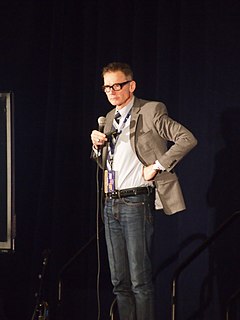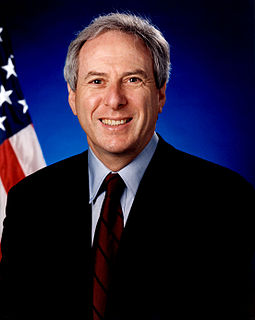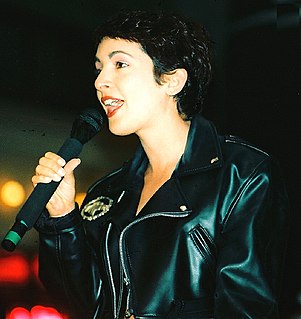A Quote by Karen Russell
Much of the way books get classified has to do with marketing decisions. I think it's more useful to think of literary books and sci-fi/fantasy books as existing on a continuum. To oppose them, to suggest that one category excludes the other, always feels bogus to me. The great Leonard Michaels line is "I wanted proximity to darkness, strangeness"? That's what I'd say I want from a book, regardless of where it falls on the fantastical spectrum - that suspense connected to a particular human character, rather than just some mechanized plot.
Quote Topics
Always
Book
Books
Category
Character
Classified
Connected
Continuum
Darkness
Decisions
Existing
Falls
Fantasy
Fantasy Books
Feels
Get
Great
Human
Just
Line
Literary
Marketing
Me
More
Much
Oppose
Other
Particular
Plot
Proximity
Rather
Regardless
Say
Sci-Fi
Some
Spectrum
Strangeness
Suggest
Suspense
Than
Them
Think
Useful
Want
Wanted
Way
Related Quotes
It was Sci-Fi and fantasy that got me reading, and Sci-Fi writers in particular have pack rat minds. They introduce all sorts of interesting themes and ideas into their books, and so for me it was a short leap to go from the fantasy and Sci-Fi genres to folklore, mythology, ancient history and philosophy. I did not read philosophy because I set out to become a philosopher; I read it because it looked interesting.
Only idiots or snobs ever really thought less of 'genre books' of course. There are stupid books and there are smart books. There are well-written books and badly written books. There are fun books and boring books. All of these distinctions are vastly more important than the distinction between the literary and the non-literary.
I don't change the language for children books. I don't make the language simpler. I use words that they might have to look up in the dictionary. The books are shorter, but there's just not that much difference other than that to be honest. And the funny thing is, I have adult writer friends [to whom I would say], "Would you think of writing a children's book?" and they go, "No, God, I wouldn't know how." They're quite intimidated by the concept of it. And when I say to children's books writers, would they write an adult book, they say no because they think they're too good for it.
Comic books sort of follow with the move - if people see the movie and if they're interested in the character and want to see more of the character, they start buying the comic books. So a good movie helps the sale of the comic books and the comic books help the movie and one hand washes the other. So, I don't think there's any reason to think that comics will die out.
When I first learned about Abrams and saw the types of books they were making, I knew I wanted my books to be published by them. Abrams books are special-when you hold one in your hands, you have the feeling that this book needed to be made. I once heard an artist say that books are fetish objects-I think Abrams gets that, because their books demand to be treasured. So who better to give comics art its proper due? I feel privileged to have found a home with Abrams.
Books can be passed around. They can be shared. A lot of people like seeing them in their houses. They are memories. People who don't understand books don't understand this. They learn from TV shows about organizing that you should get rid of the books that you aren't reading, but everyone who loves books believes the opposite. People who love books keep them around, like photos, to remind them of a great experience and so they can revisit and say, "Wow, this is a really great book."
I always give books. And I always ask for books. I think you should reward people sexually for getting you books. Don't send a thank-you note, repay them with sexual activity. If the book is rare or by your favorite author or one you didn't know about, reward them with the most perverted sex act you can think of. Otherwise, you can just make out.
I am a product of endless books. My father bought all the books he read and never got rid of any of them. There were books in the study, books in the drawing room, books in the cloakroom, books (two deep) in the great bookcase on the landing, books in a bedroom, books piled as high as my shoulder in the cistern attic...In the seemingly endless rainy afternoons I took volume after volume from the shelves. I had always the same certainty of finding a book that was new to me as a man who walks into a field has of finding a new blade of grass.
I feel lucky that I read so many books as a kid because I know that no matter how much I appreciate a book now, and I can love a book very much, it's never going to be that childhood passion for a book. There's some element, something special about the way they're reading books and experiencing books that's finite.






































